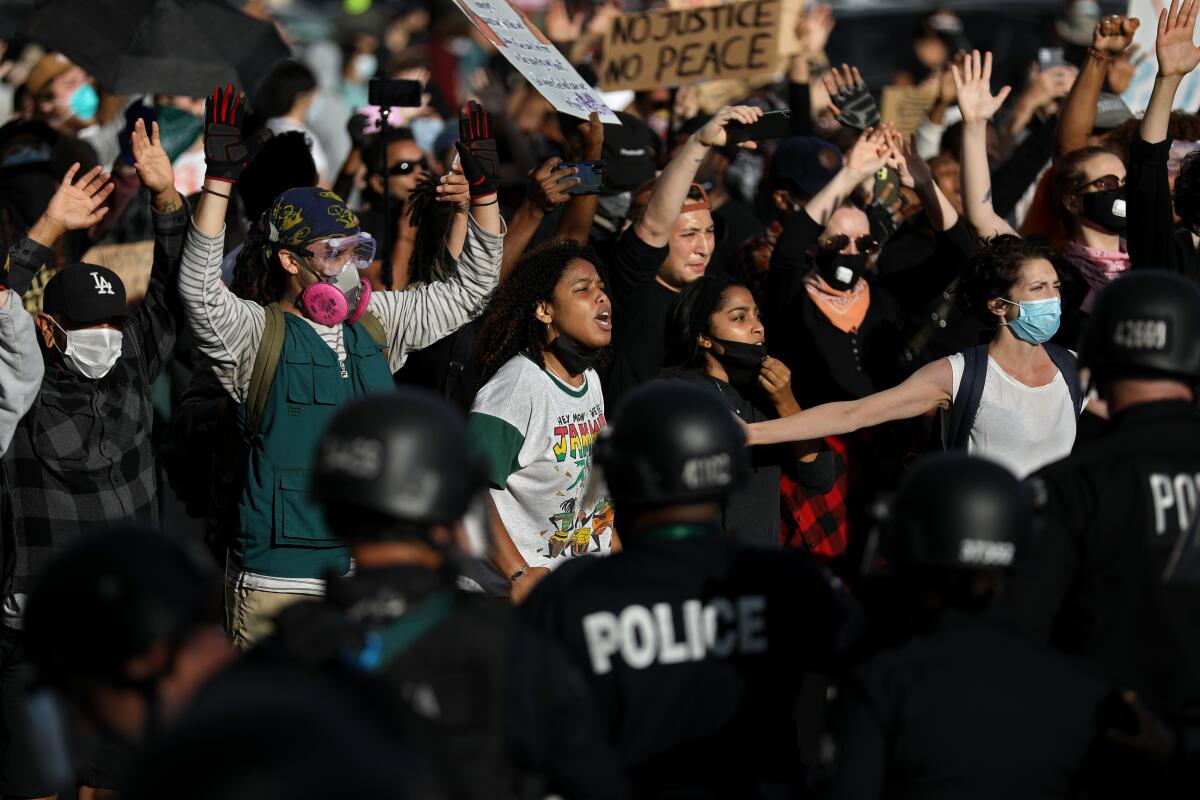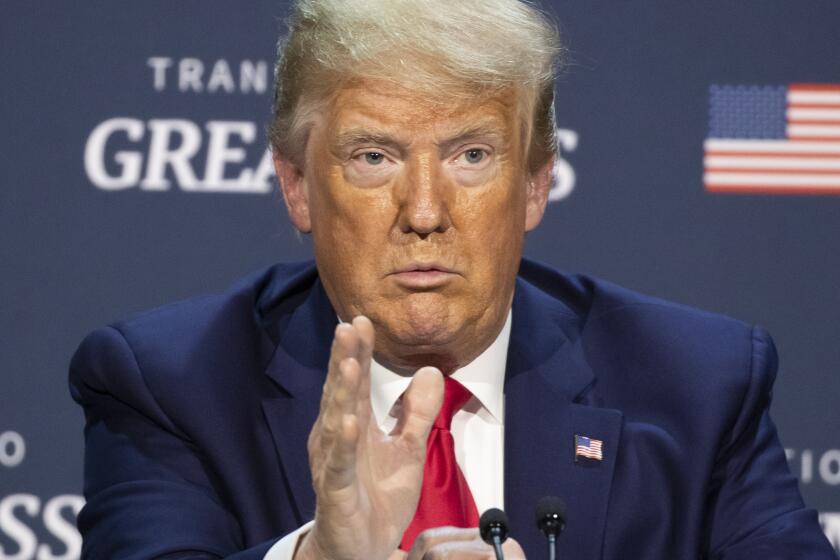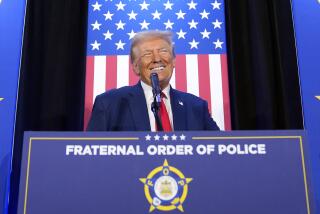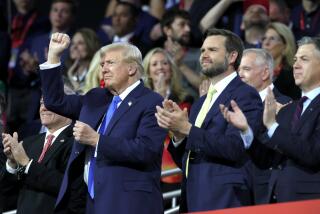Trump is stuck in a time warp on race

- Share via
WASHINGTON — A glimmer of hope for bipartisan action on police reform and race relations appeared on Capitol Hill last week. We should savor it before it disappears.
Leading Republicans, reacting to public outrage after a police officer strangled George Floyd in Minneapolis, have stampeded to put their party on the right side of history.
“We’re still wrestling with America’s original sin,” said Senate Majority Leader Mitch McConnell (R-Ky.), a man not often given to confession. He promised legislation “to respond to the obvious racial discrimination that we’ve seen.”
Only a handful of GOP elected officials have publicly criticized Trump. Others fear bringing down the wrath of the president or his supporters.
In the House, Republican leader Kevin McCarthy (R-Bakersfield) said he wants to work with the majority Democrats toward bipartisan solutions.
“Bad cops need to be held accountable, period,” he said.
McCarthy said he supports a ban on police use of chokeholds on suspects already in handcuffs, as Floyd was before his death. Rep. Tom McClintock (R-Elk Grove) said he agrees with Democrats that police officers should lose their immunity to civil suits.
Sen. Tim Scott (R-S.C.) said he wants to end “no-knock” searches, which have produced fatal shootings. And several Republican senators joined Democrats in urging the Army to rename 10 bases, all in the South, that bear the names of Confederate generals.
This wasn’t a wholesale conversion. No one joined Sen. Mitt Romney (R-Utah) in bravely declaring that “black lives matter.” No one dared name the problem as bluntly as former President George W. Bush, who denounced “systemic racism.”
There was a wide gulf between the mild measures most Republicans supported and the more sweeping actions Democrats proposed, including a complete ban on police chokeholds and provisions that would make it easier to hold officers legally accountable.
Still, it was a rare moment of opportunity in a Congress distinguished mostly for partisan gridlock. Rep. Karen Bass (D-Los Angeles) and Sen. Cory Booker (D-New Jersey), perennial optimists, said they believed bipartisan action is possible — and that the shared outrage over Floyd’s death should not be squandered.
Then there’s President Trump. He’s in a time warp, treating racial inequality as if we were stuck in the 1950s.
A traditional president in a crisis like this — Republican or Democratic — might give a statesmanlike speech seeking to bind the nation together. He might convene a White House panel to hear from Black victims of police brutality and experts in police reform. He might even propose legislation.
Trump did none of those things. Instead, he threatened to unleash combat troops against U.S. citizens and denounced governors and mayors who, in his telling, needed to crack down on radical anarchists from “antifa,” even though most protests were peaceful.
According to Trump, the problem isn’t racial discrimination or police brutality. It’s law and order — or, as he shouts repeatedly on Twitter, “LAW & ORDER!” (He’s never tweeted “JUSTICE & EQUALITY!” I checked.)
When Trump went to Dallas on Thursday, he told a roundtable that police should “dominate the streets.” He only mentioned racial equality in what sounded like an afterthought.
“We have to work together to confront bigotry and prejudice,” he said. “I think we’re going to do [it] very easily. It will go quickly.”
Precisely how, he declined to say. Nor did he suggest any measures to curb police abuses.
Asked later by Fox News if he favors a ban on chokeholds, Trump seemed to take both sides. “Generally speaking, it should be ended,” he said, unless “a police officer is in a bad scuffle.”
That vague guidance won’t help nervous Republicans in Congress who worry about taking a position that the president might suddenly denounce.
Trump has drawn a much clearer line in favor of Confederate generals. Although the Pentagon has been open to renaming the 10 Army bases, Trump tweeted that his administration “will not even consider the renaming of these Magnificent and Fabled Military Installations.”
That created a wedge issue in his own party. Solidly conservative GOP senators, including Roy Blunt of Missouri and James Lankford of Oklahoma, announced it was time to remove rebels’ names from U.S. bases. Trump said he’d veto such a bill.
Part of the problem is that Trump’s reelection strategy rests on energizing white conservative voters, not on expanding his appeal.
The president won in 2016 partly by stoking fears of immigrants and Islamic terrorists. Now he’s fanning fears of “looters” and “THUGS,” code words often wielded against people of color.
If Republicans want police reform laws, McConnell and McCarthy need to convince the president it’s in his interest to sign the bills. It could determine whether Republicans preserve their Senate majority, where at least three GOP members from swing states are in serious danger.
This isn’t rocket science. Trump’s “law and order” tweets may captivate his base, but polls show a clear majority of Americans also want police reform and racial justice. That creates an opportunity for compromise.
“Most voters want police accountability,” a GOP strategist told me. “We get that. If both sides can agree on a few first steps, we could actually change the country for the better.”
The measures GOP leaders are drafting will never satisfy progressives, but they’d still add up to progress.
It won’t be easy for Republicans and Democrats to agree. They’re out of practice, and it’s an election year.
But for them to succeed, Trump needs to get out of the way.
More to Read
Get the L.A. Times Politics newsletter
Deeply reported insights into legislation, politics and policy from Sacramento, Washington and beyond. In your inbox twice per week.
You may occasionally receive promotional content from the Los Angeles Times.











